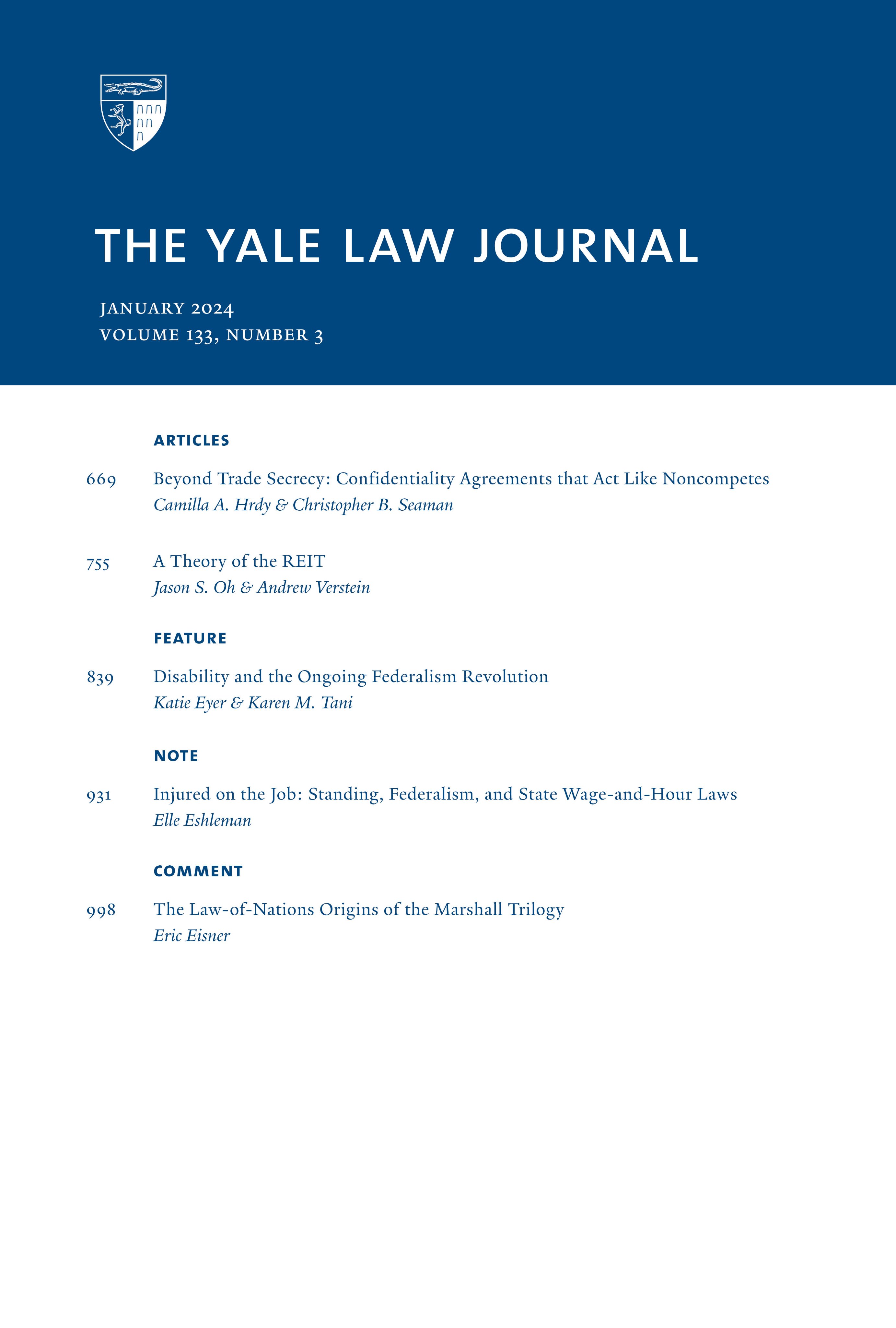Article III Judicial Power, the Adverse-Party Requirement, and Non-Contentious Jurisdiction
IF 5.2
1区 社会学
Q1 LAW
引用次数: 7
Abstract
The jurisprudence of Article III has so far failed to confront a fundamental tension in the theory of adverse parties. On the one hand, Article III has been said to limit the federal courts to the resolution of concrete disputes between adverse parties, one of whom traces her injury to the other’s conduct. On the other hand, Congress has repeatedly conferred power on the federal courts to hear ex parte proceedings that feature no opponent at all. Such proceedings call upon the federal courts to play an inquisitorial role that has seemed hard to square with the nation’s commitment to an adversary system. In this article, we offer a catalog of ex parte proceedings and the first general theory of how those proceedings fit within our largely adversarial federal judicial system. We argue that Article III embraces two kinds of judicial power: that over disputes between adverse parties, which was known in Roman and civil law as "contentious" jurisdiction, and that over ex parte and other non-contentious proceedings, which was described in Roman and civil law as voluntary or "non-contentious" jurisdiction. Non-contentious jurisdiction allows a party to seek a binding determination of a claim of right in the absence of an adverse opponent; it was incorporated into such familiar bodies of civil law as equity, admiralty, and ecclesiastical practice and promptly introduced into the federal judicial practice of the early Republic. It was non-contentious jurisdiction that allowed the federal courts to entertain such familiar ex parte proceedings as applications for naturalization, administrative proceedings in bankruptcy jurisdiction, guilty pleas and ex parte warrant applications, and to conduct inquisitorial proceedings in connection with the entry of default judgments. Apart from casting doubt on the view that Article III embeds an unyielding constitutional requirement of adverse parties, the construct of non-contentious jurisdiction requires that we re-consider the injury-in-fact test of standing doctrine as well as the underpinnings of such judicial power standards as Hayburn’s Case and Tutun v. United States. Non-contentious jurisdiction also sheds new light on Article III’s elusive case-controversy distinction. Finally, by offering a theoretical account of practices that many view as aberrations in the exercise of federal judicial power, our examination of non-contentious jurisdiction better situates Article III within America’s broader legal inheritance.第三条司法权、对方要求和无争议管辖权
到目前为止,第三条的法理学未能面对对方理论中的根本紧张关系。一方面,有人说第三条限制了联邦法院解决敌对各方之间的具体争端,其中一方将其伤害归咎于另一方的行为。另一方面,国会一再授权联邦法院审理没有对手的单方面诉讼。这类诉讼要求联邦法院发挥调查的作用,而这似乎很难与美国对对抗制度的承诺相一致。在本文中,我们提供了一个单方面诉讼的目录,以及这些诉讼如何适应我们主要是对抗性的联邦司法系统的第一个一般理论。我们认为,第三条包含两种类型的司法权:一种是针对敌对双方之间的纠纷的司法权,在罗马法和民法中被称为“争议”司法权,另一种是针对单方面和其他无争议程序的司法权,在罗马法和民法中被描述为自愿或“无争议”司法权。无争议管辖权允许一方当事人在没有敌对对手的情况下寻求对权利要求的有约束力的裁定;它被纳入诸如衡平法、海事法和教会法等熟悉的民法机构,并迅速引入共和国早期的联邦司法实践。正是无争议的管辖权使联邦法院能够受理诸如入籍申请、破产管辖的行政程序、认罪和单方面逮捕令申请等熟悉的单方面诉讼程序,并就缺席判决的生效进行调查程序。除了对《宪法》第三条包含了对对立方的不可动摇的宪法要求这一观点提出质疑外,无争议管辖权的构建要求我们重新考虑常设原则的损害事实检验,以及诸如Hayburn案和Tutun诉美国案等司法权标准的基础。无争议管辖权也为第三条中难以捉摸的案件争议区分提供了新的线索。最后,通过对许多人认为是联邦司法权行使失常的实践提供理论解释,我们对无争议管辖权的考察更好地将第三条置于美国更广泛的法律遗产中。
本文章由计算机程序翻译,如有差异,请以英文原文为准。
求助全文
约1分钟内获得全文
求助全文
来源期刊

Yale Law Journal
LAW-
CiteScore
4.50
自引率
6.20%
发文量
0
期刊介绍:
The Yale Law Journal Online is the online companion to The Yale Law Journal. It replaces The Pocket Part, which was the first such companion to be published by a leading law review. YLJ Online will continue The Pocket Part"s mission of augmenting the scholarship printed in The Yale Law Journal by providing original Essays, legal commentaries, responses to articles printed in the Journal, podcast and iTunes University recordings of various pieces, and other works by both established and emerging academics and practitioners.
 求助内容:
求助内容: 应助结果提醒方式:
应助结果提醒方式:


